20 八年级上册Unit 2 How often do you exercise?重点知识点预习-2023年(七升八)新八年级暑假衔接自学课(人教版)(带答案)
文档属性
| 名称 | 20 八年级上册Unit 2 How often do you exercise?重点知识点预习-2023年(七升八)新八年级暑假衔接自学课(人教版)(带答案) | 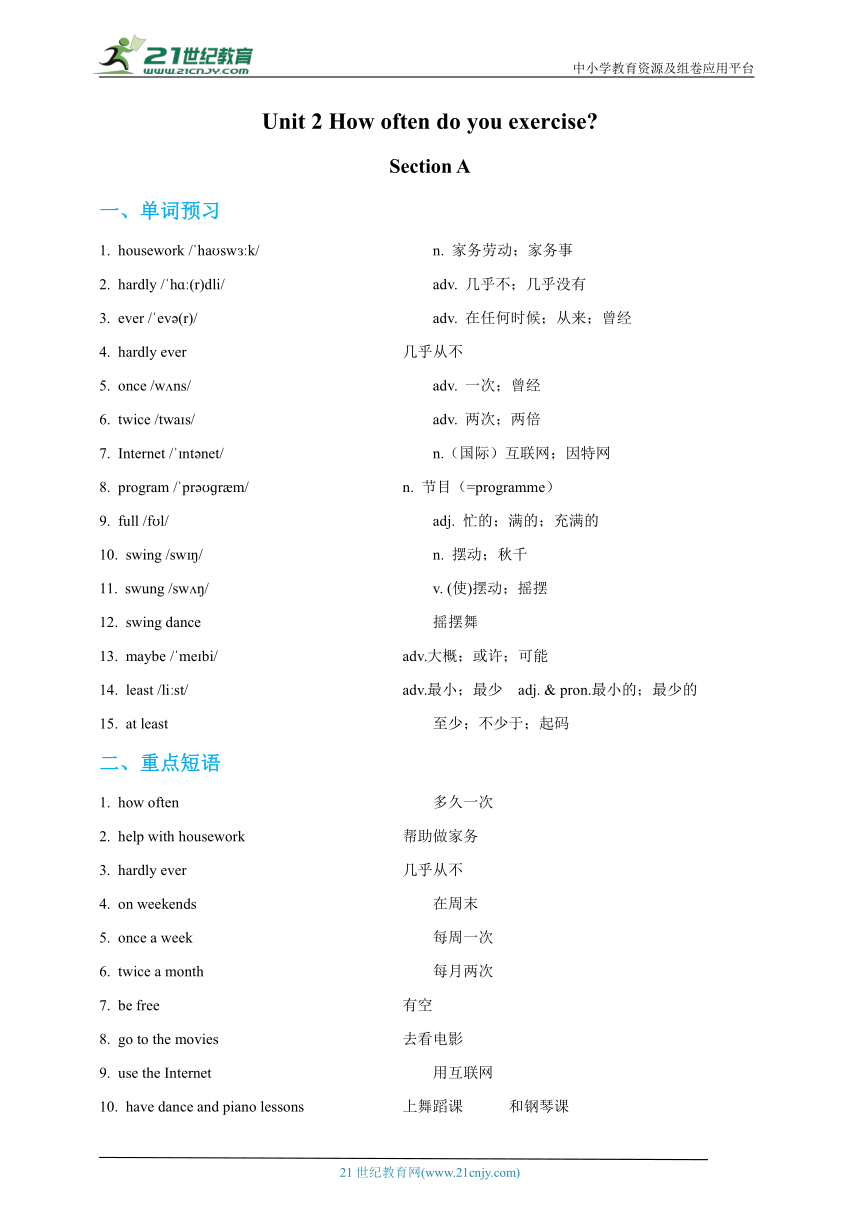 | |
| 格式 | doc | ||
| 文件大小 | 569.8KB | ||
| 资源类型 | 试卷 | ||
| 版本资源 | 人教新目标(Go for it)版 | ||
| 科目 | 英语 | ||
| 更新时间 | 2023-07-03 20:50:57 | ||
图片预览

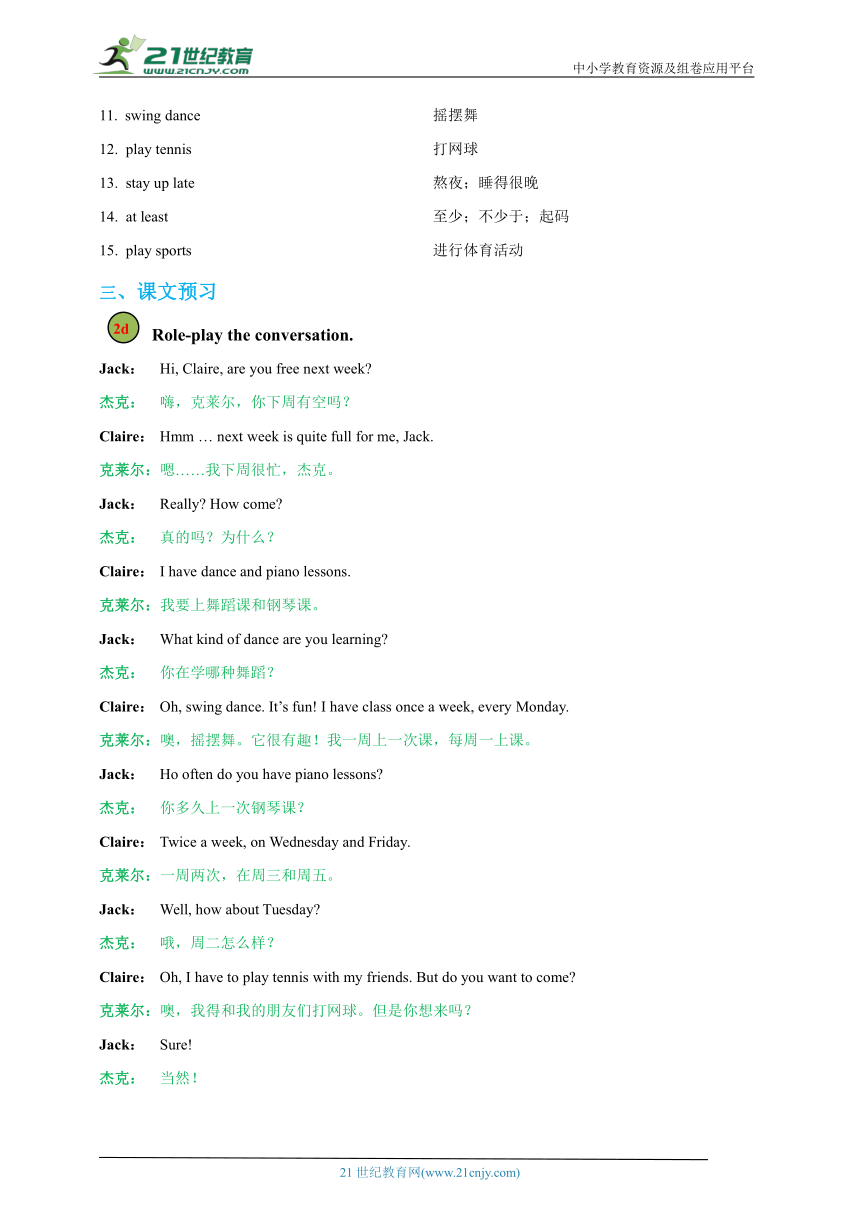
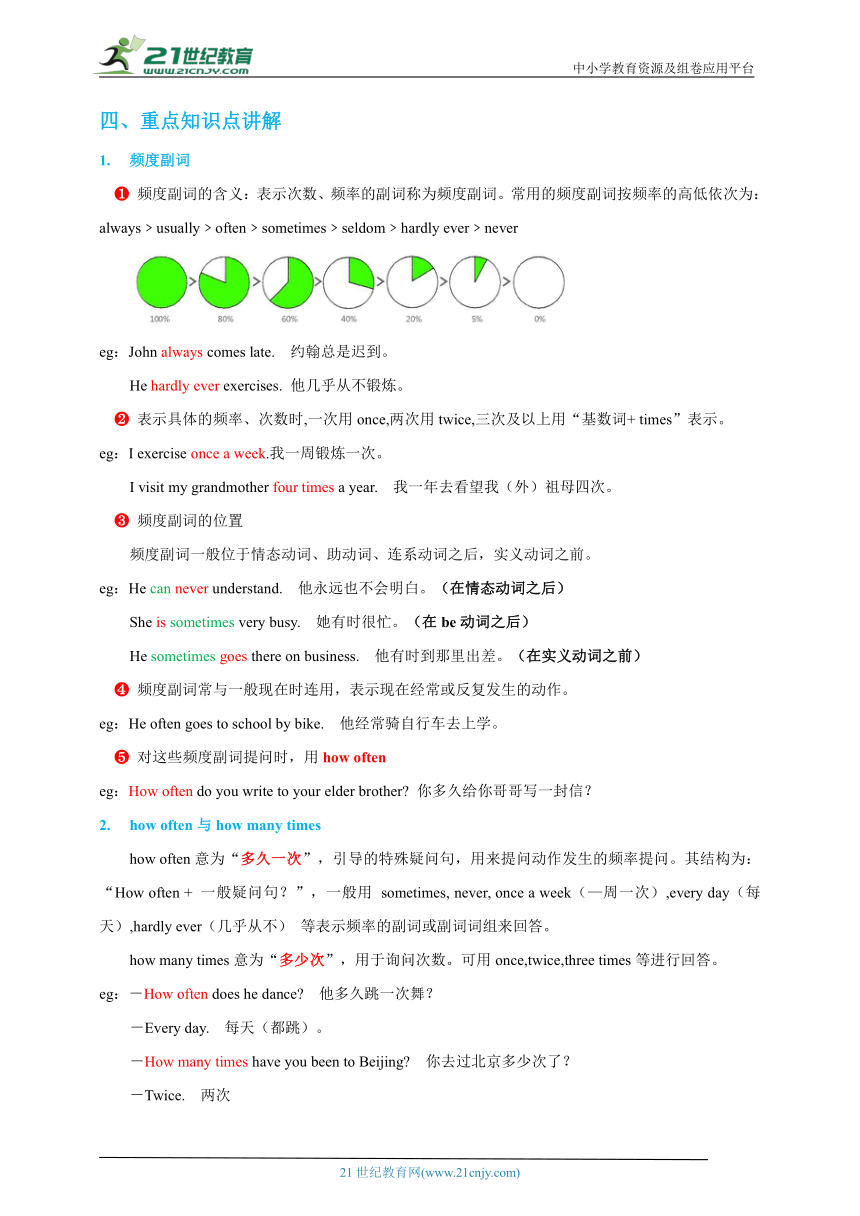
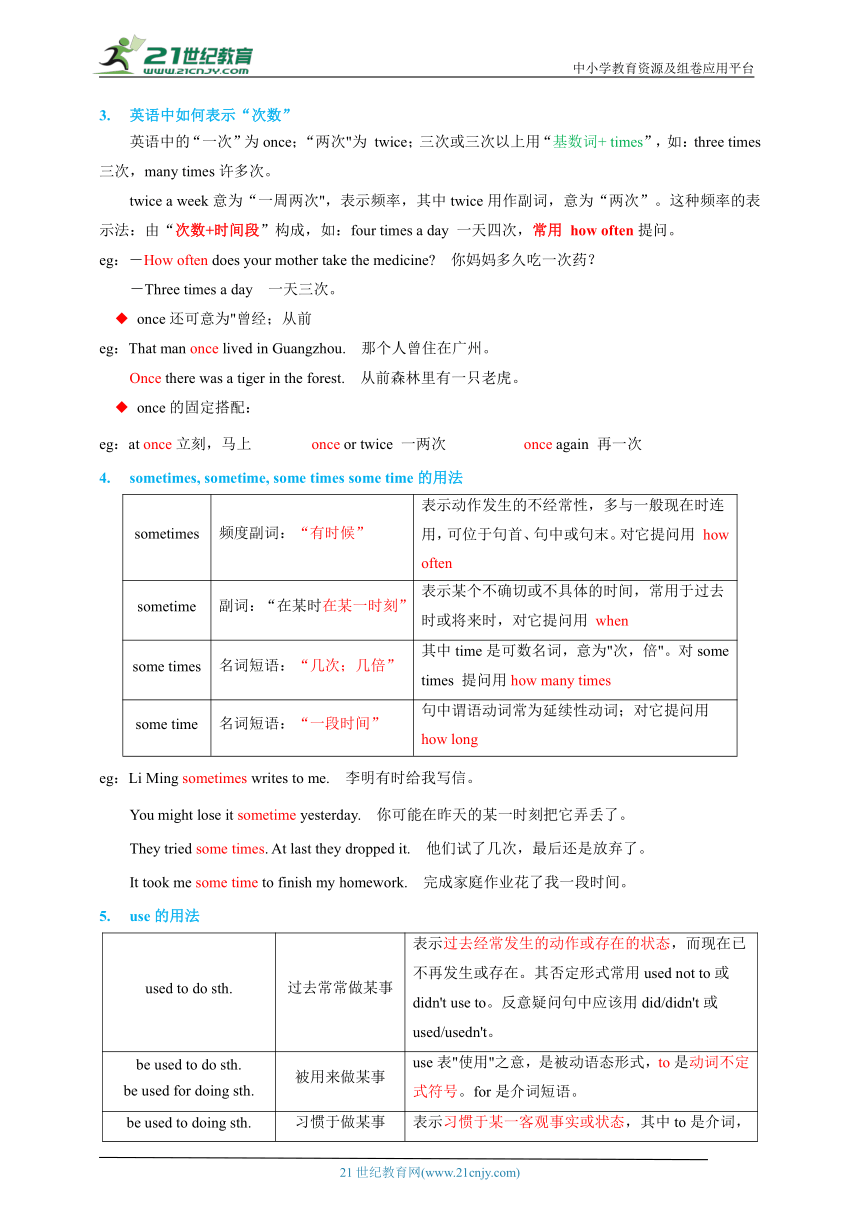
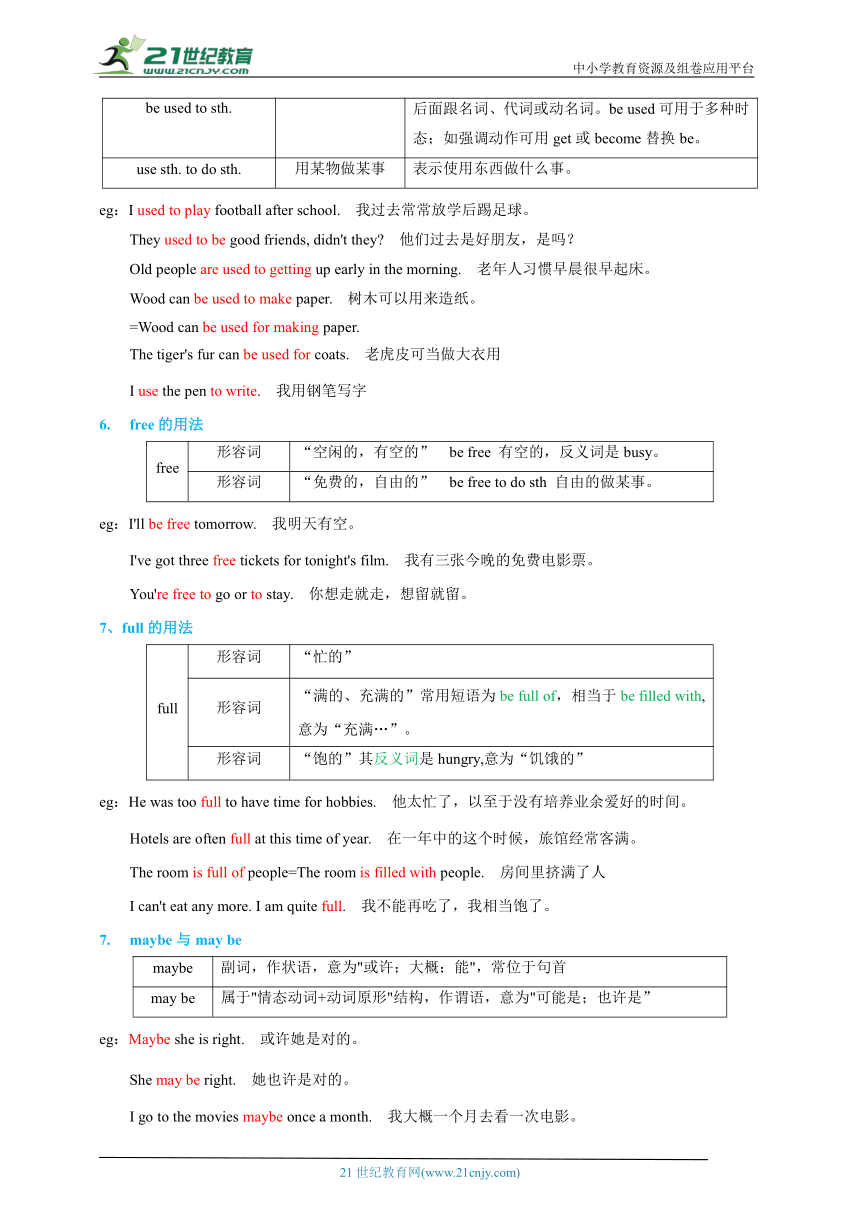
文档简介
中小学教育资源及组卷应用平台
Unit 2 How often do you exercise
Section A
一、单词预习
housework / ha sw k/ n. 家务劳动;家务事
hardly / hɑ (r)dli/ adv. 几乎不;几乎没有
ever / ev (r)/ adv. 在任何时候;从来;曾经
hardly ever 几乎从不
once /w ns/ adv. 一次;曾经
twice /twa s/ adv. 两次;两倍
Internet / nt net/ n.(国际)互联网;因特网
program / pr ɡr m/ n. 节目(=programme)
full /f l/ adj. 忙的;满的;充满的
swing /sw / n. 摆动;秋千
swung /sw / v. (使)摆动;摇摆
swing dance 摇摆舞
maybe / me bi/ adv.大概;或许;可能
least /li st/ adv.最小;最少 adj. & pron.最小的;最少的
at least 至少;不少于;起码
二、重点短语
how often 多久一次
help with housework 帮助做家务
hardly ever 几乎从不
on weekends 在周末
once a week 每周一次
twice a month 每月两次
be free 有空
go to the movies 去看电影
use the Internet 用互联网
have dance and piano lessons 上舞蹈课 和钢琴课
swing dance 摇摆舞
play tennis 打网球
stay up late 熬夜;睡得很晚
at least 至少;不少于;起码
play sports 进行体育活动
三、课文预习
Role-play the conversation.
Jack: Hi, Claire, are you free next week
杰克: 嗨,克莱尔,你下周有空吗?
Claire: Hmm … next week is quite full for me, Jack.
克莱尔:嗯……我下周很忙,杰克。
Jack: Really How come
杰克: 真的吗?为什么?
Claire: I have dance and piano lessons.
克莱尔:我要上舞蹈课和钢琴课。
Jack: What kind of dance are you learning
杰克: 你在学哪种舞蹈?
Claire: Oh, swing dance. It’s fun! I have class once a week, every Monday.
克莱尔:噢,摇摆舞。它很有趣!我一周上一次课,每周一上课。
Jack: Ho often do you have piano lessons
杰克: 你多久上一次钢琴课?
Claire: Twice a week, on Wednesday and Friday.
克莱尔:一周两次,在周三和周五。
Jack: Well, how about Tuesday
杰克: 哦,周二怎么样?
Claire: Oh, I have to play tennis with my friends. But do you want to come
克莱尔:噢,我得和我的朋友们打网球。但是你想来吗?
Jack: Sure!
杰克: 当然!
四、重点知识点讲解
频度副词
频度副词的含义:表示次数、频率的副词称为频度副词。常用的频度副词按频率的高低依次为:always﹥usually﹥often﹥sometimes﹥seldom﹥hardly ever﹥never
eg:John always comes late. 约翰总是迟到。
He hardly ever exercises. 他几乎从不锻炼。
表示具体的频率、次数时,一次用once,两次用twice,三次及以上用“基数词+ times”表示。
eg:I exercise once a week.我一周锻炼一次。
I visit my grandmother four times a year. 我一年去看望我(外)祖母四次。
频度副词的位置
频度副词一般位于情态动词、助动词、连系动词之后,实义动词之前。
eg:He can never understand. 他永远也不会明白。(在情态动词之后)
She is sometimes very busy. 她有时很忙。(在be动词之后)
He sometimes goes there on business. 他有时到那里出差。(在实义动词之前)
频度副词常与一般现在时连用,表示现在经常或反复发生的动作。
eg:He often goes to school by bike. 他经常骑自行车去上学。
对这些频度副词提问时,用how often
eg:How often do you write to your elder brother 你多久给你哥哥写一封信?
how often与how many times
how often意为“多久一次”,引导的特殊疑问句,用来提问动作发生的频率提问。其结构为:“How often + 一般疑问句?”,一般用 sometimes, never, once a week(—周一次),every day(每天),hardly ever(几乎从不) 等表示频率的副词或副词词组来回答。
how many times意为“多少次”,用于询问次数。可用once,twice,three times等进行回答。
eg:-How often does he dance 他多久跳一次舞?
-Every day. 每天(都跳)。
-How many times have you been to Beijing 你去过北京多少次了?
-Twice. 两次
英语中如何表示“次数”
英语中的“一次”为once;“两次"为 twice;三次或三次以上用“基数词+ times”,如:three times三次,many times许多次。
twice a week意为“一周两次",表示频率,其中twice用作副词,意为“两次”。这种频率的表示法:由“次数+时间段”构成,如:four times a day 一天四次,常用 how often提问。
eg:-How often does your mother take the medicine 你妈妈多久吃一次药?
-Three times a day 一天三次。
◆ once还可意为"曾经;从前
eg:That man once lived in Guangzhou. 那个人曾住在广州。
Once there was a tiger in the forest. 从前森林里有一只老虎。
◆ once的固定搭配:
eg:at once立刻,马上 once or twice 一两次 once again 再一次
sometimes, sometime, some times some time的用法
sometimes 频度副词:“有时候” 表示动作发生的不经常性,多与一般现在时连用,可位于句首、句中或句末。对它提问用 how often
sometime 副词:“在某时在某一时刻” 表示某个不确切或不具体的时间,常用于过去时或将来时,对它提问用 when
some times 名词短语:“几次;几倍” 其中time是可数名词,意为"次,倍"。对some times 提问用how many times
some time 名词短语:“一段时间” 句中谓语动词常为延续性动词;对它提问用how long
eg:Li Ming sometimes writes to me. 李明有时给我写信。
You might lose it sometime yesterday. 你可能在昨天的某一时刻把它弄丢了。
They tried some times. At last they dropped it. 他们试了几次,最后还是放弃了。
It took me some time to finish my homework. 完成家庭作业花了我一段时间。
use的用法
used to do sth. 过去常常做某事 表示过去经常发生的动作或存在的状态,而现在已不再发生或存在。其否定形式常用used not to或didn't use to。反意疑问句中应该用did/didn't或used/usedn't。
be used to do sth.be used for doing sth. 被用来做某事 use表"使用"之意,是被动语态形式,to是动词不定式符号。for是介词短语。
be used to doing sth.be used to sth. 习惯于做某事 表示习惯于某一客观事实或状态,其中to是介词,后面跟名词、代词或动名词。be used可用于多种时态;如强调动作可用get或become替换be。
use sth. to do sth. 用某物做某事 表示使用东西做什么事。
eg:I used to play football after school. 我过去常常放学后踢足球。
They used to be good friends, didn't they 他们过去是好朋友,是吗?
Old people are used to getting up early in the morning. 老年人习惯早晨很早起床。
Wood can be used to make paper. 树木可以用来造纸。
=Wood can be used for making paper.
The tiger's fur can be used for coats. 老虎皮可当做大衣用
I use the pen to write. 我用钢笔写字
free的用法
free 形容词 “空闲的,有空的” be free 有空的,反义词是busy。
形容词 “免费的,自由的” be free to do sth 自由的做某事。
eg:I'll be free tomorrow. 我明天有空。
I've got three free tickets for tonight's film. 我有三张今晚的免费电影票。
You're free to go or to stay. 你想走就走,想留就留。
7、full的用法
full 形容词 “忙的”
形容词 “满的、充满的”常用短语为be full of,相当于be filled with,意为“充满…”。
形容词 “饱的”其反义词是hungry,意为“饥饿的”
eg:He was too full to have time for hobbies. 他太忙了,以至于没有培养业余爱好的时间。
Hotels are often full at this time of year. 在一年中的这个时候,旅馆经常客满。
The room is full of people=The room is filled with people. 房间里挤满了人
I can't eat any more. I am quite full. 我不能再吃了,我相当饱了。
maybe与may be
maybe 副词,作状语,意为"或许;大概;能",常位于句首
may be 属于"情态动词+动词原形"结构,作谓语,意为"可能是;也许是”
eg:Maybe she is right. 或许她是对的。
She may be right. 她也许是对的。
I go to the movies maybe once a month. 我大概一个月去看一次电影。
Section B
一、单词预习
junk /d k/ n. 无用的东西;无价值的东西
junk food 垃圾食品
coffee/ k fi/, / k fi/ n. 咖啡
health /helθ/ n. 健康;人的身体(或精神)状态
result /r z lt/ n. 结果;后果
percent /p s nt/ n. 百分之……
online / n la n/; / ɑ n la n/ adj. & adv. 在线(的);联网(的)
television / tel v n/ n. 电视机;电视节目
although / l / conj. 虽然;尽管;即使
through /θru / prep. 以;凭借;穿过
mind /ma nd/ n. 头脑;心智
body / b di/ n. 身体
such /s t / adj. & pron. 这样的;那样的;类似的
such as 例如;像……这样
together /t ɡe (r)/ adv. 在一起;共同
die /da / v. 消失;灭亡;死亡
writer / ra t (r)/ n. 作者;作家
dentist / dent st/ n. 牙科医生
magazine / m ɡ zi n/; / m ɡ zi n/ n. 杂志;期刊
however /ha ev (r)/ adv. 然而;不过
than / n, n/ prep. & conj. 比
more than 多于
almost / lm st/ adv. 几乎;差不多
none /n n/ pron. 没有一个;毫无
less /les/ adv. 较少;较小 pron. & adj. 较少的;更少的
less than 少于
point /p nt/ n. 得分;点 v. 指;指向
Claire /kle /; /kler/ 克莱尔(女名)
Sue /su:/ 休 (女名)
American Teenager/ ti ne d (r)/ 《美国青少年》(文中为虚构的杂志名称)
二、重点短语
junk food 垃圾食品
be good for 对……有好处
go camping 去野营
not……at all 一点儿也不
go online 上网
in one's free time 在某人的业余时间
the best way to do sth. 做某事的最好方式
such as 例如;像……这样
more than 多于
less than 少于
三、课文预习
Read the article and complete the pie charts on the next page.
What Do No.5 High School Students Do in Their Free Time
第五中学的学生们在他们的空闲时间做什么?
Last month we asked our students about their free time activities. Our questions were about exercise, use of the Internet and watching TV. Here are the results.
上个月,我们询问了学生们关于他们的业余活动的情况。我们的问题是关于锻炼、因特网的使用和看电视的。这是(调查)结果。
We found that only fifteen percent of our students exercise every day. Forty-five percent exercise four to six times a week. Twenty percent exercise only one to three times a week. And twenty percent do not exercise at all!
我们发现只有15%的学生每天锻炼。45%的学生一周锻炼4到6次。20%的学生一周仅锻炼1到3次。还有20%的学生根本不锻炼!
We all know that many students often go online, but we were surprised that ninety percent of them use the Internet every day. The other ten percent use it at least three or four times a week. Most students use it for fun and not for homework.
我们都知道很多学生经常上网,但令我们感到惊讶的是,他们中90%的学生每天使用因特网。另外10%的学生一周至少使用三四次。大多数学生使用因特网是为了娱乐,而不是为了家庭作业。
The answers to our questions about watching television were also interesting. Only two percent of the students watch TV one to three times a week. Thirteen percent watch TV four to six times a week. And eighty-five percent watch TV every day! Although many students like to watch sports, game shows are the most popular.
对我们提出的关于看电视的问题的回答也很有意思。只有2%的学生一周看1到3次电视。13%的学生一周看4到6次电视。而且85%的学生每天看电视!虽然许多学生喜欢观看体育节目,但是游戏类节目是最受欢迎的。
It is good to relax by using the Internet or watching game shows, but we think the best way to relax is through exercise. It is healthy for the mind and the body. Exercise such as playing sports is fun, and you can spend time with your friends and family as you play together. And remember, “Old habits die hard.” So start exercising before it’s too late!
通过使用互联网或观看游戏类节目来放松很好,但是我们认为最好的放松方式是通过锻炼。它对身心健康有益。比如进行体育活动这样的锻炼是有趣的,而且当你和你的朋友及家人一起锻炼的时候,你可以和他们共度时光。还要记住:“旧习难改。”所以在一切变得太迟之前开始锻炼吧!
四、重点知识点讲解
be good for的用法
be good for 意为“对……有益”,后接名词、代词或动名词。
be good at 意为“擅长……”,后接名词、代词或动名词。
be good with 意为“善于应对……”
be good to 意为“对……友好”
eg:Eating vegetables is good for health. 吃蔬菜对你的健康有益。
I’m good at (playing) basketball. 我擅长(打)篮球。
He is good with children. 他善于应付孩子。/管理孩子有一套。
He is good to me. 他对我很友好。
health的用法
health为不可数名词,意为“健康,健康状况”,常用于be in good/poor/bad health结构中,表示“健康状况好/不好/差”。keep/stay/be in good health=keep/stay/be healthy “保持健康”
eg:Smoking is bad for your health. 吸烟有害健康。
You must keep your health. 你必须保持健康
health→+y→healthy变成了形容词,意为“健康的,健壮的”同义词为fit,反义词为unhealthy或者weak。
eg:Although my uncle is old,he looks very strong and healthy.
虽然我叔叔老了,但他看起来很强壮很健康。
This is a healthy way of living. 这是一种健康的生活方式。
healthy→变y为i+ly→healthily变成了副词,意为“健康地,健壮地”
eg:We grow up healthily in the arms of our mother. 我们在母亲的怀抱中健康成长。
ask的用法
ask sb. about sth. 询问某人关于某事的情况。
ask sb. (not) to do sth. 要求某人(不要)做某事。
ask for “要求;请求”,其宾语是物。
ask sb. for sth. 意为“向某人要某物”
eg:I ask my teacher about today’s homework. 我问老师今天的家庭作业。
Mary asked me something about my birth day party. 玛丽问我关于我生日聚会的事情。
My mother asked me to clean the room. 我妈妈要求我打扫房间。
You can ask for help from the policeman. 你可以向警察求助。
You can ask your teacher for help. 你可以向老师求助。
result的用法
result可数名词,意为“结果;后果”,短语 the result of 意为“……的结果”,as a result意为“结果是,作为结果”。
eg:Here is the result of our survey about the use of Internet.
这是我们关于互联网使用情况的调查结果。
percent的用法
percent名词,意为“百分之……”。英语中的百分数表达为“基数词+ percent”,percent无复数形式。
eg:About 50 percent of the pupils are girls 大约百分之五十的小学生是女孩儿。
分数的构成:分子用基数词,分母用序数词;分子大于1,分母加 -s。
如:two thirds twenty-three twenty-fifths
“百分数+ of+名词”作主语时,谓语动词的单复数形式要由Of后面的名词来决定。
基数词+ percent of +可数名词的复数 谓语动词用复数形式
基数词+ percent of +不可数名词 谓语动词用单数形式
eg:50% of the milk is white. 50%的牛奶是白色的。
50% of the desks are dirty. 50%的课桌是脏的。
not……at all的用法
not……at all意为“一点儿也不;根本不”
eg:I don't know about it at all. 对那件事我一点儿也不知道。
He didn't do his homework at all yesterday. 他昨天根本没做家庭作业。
◆ not at all在口语中用来回答别人的谢意或歉意,意为“不用谢,不客气,没关系”。相当于“You are welcome.”
eg:-Thank you very much 非常感谢你。
-Not at all. 不客气
-I am sorry I am late. 对不起,我迟到了。
-Oh,not at all. 哦,没关系。
go online的用法
go online=surf the Internet意为“去上网”,其中online用作副词,意为“在线;联网”。
eg:Sometimes I go online for fun. 有时我上网娱乐。
Many young people like to buy things on line. 许多年轻人喜欢网上购物。
online还可用作形容词,意为“在线的;联网的”。
eg:The online games are very popular with children 这些在线游戏深受孩子们欢迎。
the answers to……questions
the answers to…questions 为固定搭配,意为“……问题的答案/回答”,to在此为介词,意为“指向;对于;针对”。类似的短语还有:the key to the door“门的钥匙”;the solution to the problem“这个问题的解决办法”
eg:Can you find out the answers to the questions 你能找出这些问题的答案吗?
although/though的用法
although/though连词,意为“虽然;尽管”,引导让步状语从句。含although/though不能与but在同一个句子中使用。
eg:Although my grandpa is old,he looks very strong and healthy.
虽然我的爷爷老了,但他看上去很健壮。
Although it rained, the boys still played out side.
= It rained, but the boys still played outside.
尽管天下雨了,但是那些男孩儿仍在外面玩耍。
It+be+adj.+to do sth.
“It+be+adj.+to do sth.”中it为形式主语,真正的主语是to do sth.;因为主语太长,为避免头重脚轻,用it作形式主语,而把真正的主语放在后面。
eg:To drink enough water is important every day. →
It is important to drink enough water every day. 每天喝足够的水很重要。
“It + be+ adj.(+for sb.)+动词不定式+其他.”此句型常用形容词easy, difficult, hard, im portant, possible 等作表语,强调不定式的性质或特征,或不定式动作的执行者,用for sb.而不是of sb.
eg:It's necessary for the young to master two foreign languages.→
To master two foreign languages is necessary for the young.
年轻人掌握两门外语是有必要的。
“It + be+ adj.(+of sb.)+动词不定式+其他.”此句型常用表示人的品质、性格特征的形容词作表语,如:kind, nice, stupid(愚蠢), clever, foolish(愚蠢), polite, impolite, silly, selfish(自私的), consider ate(体贴的) 等。强调句型中形容词的品质、性格特征。用of sb.而不是for sb.
eg:It's very kind of you to help me with the work.= You are kind to help me with the work.
你帮助我做这项工作真是太好了。
by的用法
by介词,意为“通过,靠”,此处表示方法、手段,后接名词、代词或动词-ing形式。
eg:He had to do all the work by hand. 所有的工作他都得靠手工完成。
Mr. Green makes a living by teaching. 格林先生以教书为生。
I learn English by watching English movies. 我通过看英语电影来学习英语。
“by+交通工具”(by后不加冠词),意为“乘/驾/坐…”。by bike=take a bike
eg:I went to Beijing by plane. 我乘飞机去了北京。
“by+时间” 意为“到……时为止;在……之前”
eg:I must be in bed by ten o' clock. 我必须在十点钟以前上床睡觉。
“by+地点” 意为“在……旁边”
eg:We live by the sea. 我们住在海边。
through的用法
through 指“穿过、通过……”,强调从物体中间穿过。
across 指“穿过、通过……”,强调从物体表面穿过。
over 指“越过……”,强调从物体上方越过。
past 指“经过……”,强调从物体旁边经过。
eg:The river runs through the forest. 这条河穿过森林。
The girl runs across the road. 女孩跑过马路。
The horse jumped over the wall. 那匹马跳过了墙。
Our bus runs past this primary school. 我们的公共汽车经过这所小学。
mind的用法
1、 mind doing sth. 用作动词表示“介意,在乎”等,其后接动词时要用动名词mind to do sth. 用作动词表示“注意,当心”等,其后接动词时要用不定式。
2、 用作名词表示“脑子,心思”等,通常用作可数名词。
3、 用于“Would (Do) you mind… ”意为“请你…好不好 ”;“倘若…你见怪吗 ”(1)表示不同意,可用:Yes, I do mind./Please don't… / Better not, please. / I'd rather you didn't./I'm sorry, but… 等。(2)表示同意,可用:Oh, no, please. / No, not at all./Not at all./Certainly not. / Of course not. / No, go ahead. 等。
4、 用于 make up one's mind,意为“决定,决心”
eg:Do you mind helping us 你介意帮我们吗?
Mind the step!小心台阶!
It is healthy for the mind and the body. 它对身心健康有益。
He has a very sharp mind. 他有非常敏锐的思维。
Would (Do) you mind opening the window. 你介意打开窗户吗?
同意:Not at all, please. 不同意:I'm sorry,but it's not allowed.
It is early days yet to make up one's mind. 下决心还为时过早。
such as与 for example
such as 一般用来列举同类人或事物中的几个,放在被列举的事物与前面的名词之间,as后不加逗号。
for example 用来举例说明某种情况,一般只以同类事物中的一个为例;作为插入语,用逗号隔开,可置于句首、句中或句末
eg:We have been to many places such as Shanghai, Bei jing and Hangzhou.
我们去过很多地方,比如上海、北京和杭州。
For example, ball games have spread around the world.
例如,球类运动已经在全世界传播开了。
Noise, for example, is a kind of pollution. 例如,噪音是一种污染。
however与but
however “然而;可是”,作副词 不能直接连接两个分句,必须另起一句,用逗号隔开,表示一种补充关系。可用于句中,也可用于句首。
but “但是”,作连词 可连接前后两个单词、短语或句子,表示一种转折关系,通常不用于句首。
eg:It began to rain. However, we went out to look for the boy.
天开始下雨了,不过我们还是出去寻找那个男孩儿了。
It is a sunny morning, but very cold. 这是一个晴朗的早晨,但是很冷。
Old habits die hard.
Old habits die hard. 谚语,意为“旧习难改”。形容人们的习惯、观点或固有观念很难改变。
die 动词,意为“消失,死亡”。非延续性动词,不能和时间段连用。
eg:He died three years ago. 他三年前去世了。
less than与more than法
less than 意为“不到;少于”;其反义短语为more than,意为“多于;超过”。其中less用作副词,是little的比较级,意为“较少”。
more than 意为“超过”,more than的同义词为over,反义词组为less than。其中more用作副词,是many/much的比较级more,意为“较多”。
eg:I lived in Qingdao for more than/over ten years. 我在青岛住了10多年。
He sleeps less than seven hours every night. 他每晚的睡眠时间不到7个小时。
point的用法
point 作动词,意为“指;指向”,作可数名词,意为“得分,点”
eg:It’s rude to point at others. 指着别人是粗鲁的。
We won the match by 15 points to 5. 我们以15 : 5赢了这场比赛。
5.65:five point six five
almost的用法
almost 用作程度副词,意为“儿乎,差不多”,与nearly同义,常位于系动词、be、情态动词或助动词之后,实义动词之前。
eg:I almost forget to write to him. 我几乎忘记给他写信。
It was almost like a good dream. 这几乎就像一场美梦。
I almost forgot to watch the football game. 我几乎忘了看这场足球赛。
none的用法
none 作不定代词,意为“没有一个,毫无”。既可以指人,也可以指物。可单独使用,也可和Of连用,后跟不可数名词或可数名词复数。none of与不可数名词连用作主语时,谓语动词用单数;与可数名词复数连用作主语时,谓语动词用单、复数均可。
no one 意为“没有人;没有任何人”,只能指人,不能指物。一般单独使用,不与of连用。作主语时,谓语动词只能用单数。用来回答 以who开头的问句。
eg:None of us like the music. 我们没有人喜欢这个音乐。
None of the money on the table is mine。 桌子上的钱没有一分是我的。
None of us went to the zoo. 我们没有人去动物园。
No one wants to leave. 没有人想离开。
2d
2b
21世纪教育网 www.21cnjy.com 精品试卷·第 2 页 (共 2 页)
HYPERLINK "http://21世纪教育网(www.21cnjy.com)
" 21世纪教育网(www.21cnjy.com)
Unit 2 How often do you exercise
Section A
一、单词预习
housework / ha sw k/ n. 家务劳动;家务事
hardly / hɑ (r)dli/ adv. 几乎不;几乎没有
ever / ev (r)/ adv. 在任何时候;从来;曾经
hardly ever 几乎从不
once /w ns/ adv. 一次;曾经
twice /twa s/ adv. 两次;两倍
Internet / nt net/ n.(国际)互联网;因特网
program / pr ɡr m/ n. 节目(=programme)
full /f l/ adj. 忙的;满的;充满的
swing /sw / n. 摆动;秋千
swung /sw / v. (使)摆动;摇摆
swing dance 摇摆舞
maybe / me bi/ adv.大概;或许;可能
least /li st/ adv.最小;最少 adj. & pron.最小的;最少的
at least 至少;不少于;起码
二、重点短语
how often 多久一次
help with housework 帮助做家务
hardly ever 几乎从不
on weekends 在周末
once a week 每周一次
twice a month 每月两次
be free 有空
go to the movies 去看电影
use the Internet 用互联网
have dance and piano lessons 上舞蹈课 和钢琴课
swing dance 摇摆舞
play tennis 打网球
stay up late 熬夜;睡得很晚
at least 至少;不少于;起码
play sports 进行体育活动
三、课文预习
Role-play the conversation.
Jack: Hi, Claire, are you free next week
杰克: 嗨,克莱尔,你下周有空吗?
Claire: Hmm … next week is quite full for me, Jack.
克莱尔:嗯……我下周很忙,杰克。
Jack: Really How come
杰克: 真的吗?为什么?
Claire: I have dance and piano lessons.
克莱尔:我要上舞蹈课和钢琴课。
Jack: What kind of dance are you learning
杰克: 你在学哪种舞蹈?
Claire: Oh, swing dance. It’s fun! I have class once a week, every Monday.
克莱尔:噢,摇摆舞。它很有趣!我一周上一次课,每周一上课。
Jack: Ho often do you have piano lessons
杰克: 你多久上一次钢琴课?
Claire: Twice a week, on Wednesday and Friday.
克莱尔:一周两次,在周三和周五。
Jack: Well, how about Tuesday
杰克: 哦,周二怎么样?
Claire: Oh, I have to play tennis with my friends. But do you want to come
克莱尔:噢,我得和我的朋友们打网球。但是你想来吗?
Jack: Sure!
杰克: 当然!
四、重点知识点讲解
频度副词
频度副词的含义:表示次数、频率的副词称为频度副词。常用的频度副词按频率的高低依次为:always﹥usually﹥often﹥sometimes﹥seldom﹥hardly ever﹥never
eg:John always comes late. 约翰总是迟到。
He hardly ever exercises. 他几乎从不锻炼。
表示具体的频率、次数时,一次用once,两次用twice,三次及以上用“基数词+ times”表示。
eg:I exercise once a week.我一周锻炼一次。
I visit my grandmother four times a year. 我一年去看望我(外)祖母四次。
频度副词的位置
频度副词一般位于情态动词、助动词、连系动词之后,实义动词之前。
eg:He can never understand. 他永远也不会明白。(在情态动词之后)
She is sometimes very busy. 她有时很忙。(在be动词之后)
He sometimes goes there on business. 他有时到那里出差。(在实义动词之前)
频度副词常与一般现在时连用,表示现在经常或反复发生的动作。
eg:He often goes to school by bike. 他经常骑自行车去上学。
对这些频度副词提问时,用how often
eg:How often do you write to your elder brother 你多久给你哥哥写一封信?
how often与how many times
how often意为“多久一次”,引导的特殊疑问句,用来提问动作发生的频率提问。其结构为:“How often + 一般疑问句?”,一般用 sometimes, never, once a week(—周一次),every day(每天),hardly ever(几乎从不) 等表示频率的副词或副词词组来回答。
how many times意为“多少次”,用于询问次数。可用once,twice,three times等进行回答。
eg:-How often does he dance 他多久跳一次舞?
-Every day. 每天(都跳)。
-How many times have you been to Beijing 你去过北京多少次了?
-Twice. 两次
英语中如何表示“次数”
英语中的“一次”为once;“两次"为 twice;三次或三次以上用“基数词+ times”,如:three times三次,many times许多次。
twice a week意为“一周两次",表示频率,其中twice用作副词,意为“两次”。这种频率的表示法:由“次数+时间段”构成,如:four times a day 一天四次,常用 how often提问。
eg:-How often does your mother take the medicine 你妈妈多久吃一次药?
-Three times a day 一天三次。
◆ once还可意为"曾经;从前
eg:That man once lived in Guangzhou. 那个人曾住在广州。
Once there was a tiger in the forest. 从前森林里有一只老虎。
◆ once的固定搭配:
eg:at once立刻,马上 once or twice 一两次 once again 再一次
sometimes, sometime, some times some time的用法
sometimes 频度副词:“有时候” 表示动作发生的不经常性,多与一般现在时连用,可位于句首、句中或句末。对它提问用 how often
sometime 副词:“在某时在某一时刻” 表示某个不确切或不具体的时间,常用于过去时或将来时,对它提问用 when
some times 名词短语:“几次;几倍” 其中time是可数名词,意为"次,倍"。对some times 提问用how many times
some time 名词短语:“一段时间” 句中谓语动词常为延续性动词;对它提问用how long
eg:Li Ming sometimes writes to me. 李明有时给我写信。
You might lose it sometime yesterday. 你可能在昨天的某一时刻把它弄丢了。
They tried some times. At last they dropped it. 他们试了几次,最后还是放弃了。
It took me some time to finish my homework. 完成家庭作业花了我一段时间。
use的用法
used to do sth. 过去常常做某事 表示过去经常发生的动作或存在的状态,而现在已不再发生或存在。其否定形式常用used not to或didn't use to。反意疑问句中应该用did/didn't或used/usedn't。
be used to do sth.be used for doing sth. 被用来做某事 use表"使用"之意,是被动语态形式,to是动词不定式符号。for是介词短语。
be used to doing sth.be used to sth. 习惯于做某事 表示习惯于某一客观事实或状态,其中to是介词,后面跟名词、代词或动名词。be used可用于多种时态;如强调动作可用get或become替换be。
use sth. to do sth. 用某物做某事 表示使用东西做什么事。
eg:I used to play football after school. 我过去常常放学后踢足球。
They used to be good friends, didn't they 他们过去是好朋友,是吗?
Old people are used to getting up early in the morning. 老年人习惯早晨很早起床。
Wood can be used to make paper. 树木可以用来造纸。
=Wood can be used for making paper.
The tiger's fur can be used for coats. 老虎皮可当做大衣用
I use the pen to write. 我用钢笔写字
free的用法
free 形容词 “空闲的,有空的” be free 有空的,反义词是busy。
形容词 “免费的,自由的” be free to do sth 自由的做某事。
eg:I'll be free tomorrow. 我明天有空。
I've got three free tickets for tonight's film. 我有三张今晚的免费电影票。
You're free to go or to stay. 你想走就走,想留就留。
7、full的用法
full 形容词 “忙的”
形容词 “满的、充满的”常用短语为be full of,相当于be filled with,意为“充满…”。
形容词 “饱的”其反义词是hungry,意为“饥饿的”
eg:He was too full to have time for hobbies. 他太忙了,以至于没有培养业余爱好的时间。
Hotels are often full at this time of year. 在一年中的这个时候,旅馆经常客满。
The room is full of people=The room is filled with people. 房间里挤满了人
I can't eat any more. I am quite full. 我不能再吃了,我相当饱了。
maybe与may be
maybe 副词,作状语,意为"或许;大概;能",常位于句首
may be 属于"情态动词+动词原形"结构,作谓语,意为"可能是;也许是”
eg:Maybe she is right. 或许她是对的。
She may be right. 她也许是对的。
I go to the movies maybe once a month. 我大概一个月去看一次电影。
Section B
一、单词预习
junk /d k/ n. 无用的东西;无价值的东西
junk food 垃圾食品
coffee/ k fi/, / k fi/ n. 咖啡
health /helθ/ n. 健康;人的身体(或精神)状态
result /r z lt/ n. 结果;后果
percent /p s nt/ n. 百分之……
online / n la n/; / ɑ n la n/ adj. & adv. 在线(的);联网(的)
television / tel v n/ n. 电视机;电视节目
although / l / conj. 虽然;尽管;即使
through /θru / prep. 以;凭借;穿过
mind /ma nd/ n. 头脑;心智
body / b di/ n. 身体
such /s t / adj. & pron. 这样的;那样的;类似的
such as 例如;像……这样
together /t ɡe (r)/ adv. 在一起;共同
die /da / v. 消失;灭亡;死亡
writer / ra t (r)/ n. 作者;作家
dentist / dent st/ n. 牙科医生
magazine / m ɡ zi n/; / m ɡ zi n/ n. 杂志;期刊
however /ha ev (r)/ adv. 然而;不过
than / n, n/ prep. & conj. 比
more than 多于
almost / lm st/ adv. 几乎;差不多
none /n n/ pron. 没有一个;毫无
less /les/ adv. 较少;较小 pron. & adj. 较少的;更少的
less than 少于
point /p nt/ n. 得分;点 v. 指;指向
Claire /kle /; /kler/ 克莱尔(女名)
Sue /su:/ 休 (女名)
American Teenager/ ti ne d (r)/ 《美国青少年》(文中为虚构的杂志名称)
二、重点短语
junk food 垃圾食品
be good for 对……有好处
go camping 去野营
not……at all 一点儿也不
go online 上网
in one's free time 在某人的业余时间
the best way to do sth. 做某事的最好方式
such as 例如;像……这样
more than 多于
less than 少于
三、课文预习
Read the article and complete the pie charts on the next page.
What Do No.5 High School Students Do in Their Free Time
第五中学的学生们在他们的空闲时间做什么?
Last month we asked our students about their free time activities. Our questions were about exercise, use of the Internet and watching TV. Here are the results.
上个月,我们询问了学生们关于他们的业余活动的情况。我们的问题是关于锻炼、因特网的使用和看电视的。这是(调查)结果。
We found that only fifteen percent of our students exercise every day. Forty-five percent exercise four to six times a week. Twenty percent exercise only one to three times a week. And twenty percent do not exercise at all!
我们发现只有15%的学生每天锻炼。45%的学生一周锻炼4到6次。20%的学生一周仅锻炼1到3次。还有20%的学生根本不锻炼!
We all know that many students often go online, but we were surprised that ninety percent of them use the Internet every day. The other ten percent use it at least three or four times a week. Most students use it for fun and not for homework.
我们都知道很多学生经常上网,但令我们感到惊讶的是,他们中90%的学生每天使用因特网。另外10%的学生一周至少使用三四次。大多数学生使用因特网是为了娱乐,而不是为了家庭作业。
The answers to our questions about watching television were also interesting. Only two percent of the students watch TV one to three times a week. Thirteen percent watch TV four to six times a week. And eighty-five percent watch TV every day! Although many students like to watch sports, game shows are the most popular.
对我们提出的关于看电视的问题的回答也很有意思。只有2%的学生一周看1到3次电视。13%的学生一周看4到6次电视。而且85%的学生每天看电视!虽然许多学生喜欢观看体育节目,但是游戏类节目是最受欢迎的。
It is good to relax by using the Internet or watching game shows, but we think the best way to relax is through exercise. It is healthy for the mind and the body. Exercise such as playing sports is fun, and you can spend time with your friends and family as you play together. And remember, “Old habits die hard.” So start exercising before it’s too late!
通过使用互联网或观看游戏类节目来放松很好,但是我们认为最好的放松方式是通过锻炼。它对身心健康有益。比如进行体育活动这样的锻炼是有趣的,而且当你和你的朋友及家人一起锻炼的时候,你可以和他们共度时光。还要记住:“旧习难改。”所以在一切变得太迟之前开始锻炼吧!
四、重点知识点讲解
be good for的用法
be good for 意为“对……有益”,后接名词、代词或动名词。
be good at 意为“擅长……”,后接名词、代词或动名词。
be good with 意为“善于应对……”
be good to 意为“对……友好”
eg:Eating vegetables is good for health. 吃蔬菜对你的健康有益。
I’m good at (playing) basketball. 我擅长(打)篮球。
He is good with children. 他善于应付孩子。/管理孩子有一套。
He is good to me. 他对我很友好。
health的用法
health为不可数名词,意为“健康,健康状况”,常用于be in good/poor/bad health结构中,表示“健康状况好/不好/差”。keep/stay/be in good health=keep/stay/be healthy “保持健康”
eg:Smoking is bad for your health. 吸烟有害健康。
You must keep your health. 你必须保持健康
health→+y→healthy变成了形容词,意为“健康的,健壮的”同义词为fit,反义词为unhealthy或者weak。
eg:Although my uncle is old,he looks very strong and healthy.
虽然我叔叔老了,但他看起来很强壮很健康。
This is a healthy way of living. 这是一种健康的生活方式。
healthy→变y为i+ly→healthily变成了副词,意为“健康地,健壮地”
eg:We grow up healthily in the arms of our mother. 我们在母亲的怀抱中健康成长。
ask的用法
ask sb. about sth. 询问某人关于某事的情况。
ask sb. (not) to do sth. 要求某人(不要)做某事。
ask for “要求;请求”,其宾语是物。
ask sb. for sth. 意为“向某人要某物”
eg:I ask my teacher about today’s homework. 我问老师今天的家庭作业。
Mary asked me something about my birth day party. 玛丽问我关于我生日聚会的事情。
My mother asked me to clean the room. 我妈妈要求我打扫房间。
You can ask for help from the policeman. 你可以向警察求助。
You can ask your teacher for help. 你可以向老师求助。
result的用法
result可数名词,意为“结果;后果”,短语 the result of 意为“……的结果”,as a result意为“结果是,作为结果”。
eg:Here is the result of our survey about the use of Internet.
这是我们关于互联网使用情况的调查结果。
percent的用法
percent名词,意为“百分之……”。英语中的百分数表达为“基数词+ percent”,percent无复数形式。
eg:About 50 percent of the pupils are girls 大约百分之五十的小学生是女孩儿。
分数的构成:分子用基数词,分母用序数词;分子大于1,分母加 -s。
如:two thirds twenty-three twenty-fifths
“百分数+ of+名词”作主语时,谓语动词的单复数形式要由Of后面的名词来决定。
基数词+ percent of +可数名词的复数 谓语动词用复数形式
基数词+ percent of +不可数名词 谓语动词用单数形式
eg:50% of the milk is white. 50%的牛奶是白色的。
50% of the desks are dirty. 50%的课桌是脏的。
not……at all的用法
not……at all意为“一点儿也不;根本不”
eg:I don't know about it at all. 对那件事我一点儿也不知道。
He didn't do his homework at all yesterday. 他昨天根本没做家庭作业。
◆ not at all在口语中用来回答别人的谢意或歉意,意为“不用谢,不客气,没关系”。相当于“You are welcome.”
eg:-Thank you very much 非常感谢你。
-Not at all. 不客气
-I am sorry I am late. 对不起,我迟到了。
-Oh,not at all. 哦,没关系。
go online的用法
go online=surf the Internet意为“去上网”,其中online用作副词,意为“在线;联网”。
eg:Sometimes I go online for fun. 有时我上网娱乐。
Many young people like to buy things on line. 许多年轻人喜欢网上购物。
online还可用作形容词,意为“在线的;联网的”。
eg:The online games are very popular with children 这些在线游戏深受孩子们欢迎。
the answers to……questions
the answers to…questions 为固定搭配,意为“……问题的答案/回答”,to在此为介词,意为“指向;对于;针对”。类似的短语还有:the key to the door“门的钥匙”;the solution to the problem“这个问题的解决办法”
eg:Can you find out the answers to the questions 你能找出这些问题的答案吗?
although/though的用法
although/though连词,意为“虽然;尽管”,引导让步状语从句。含although/though不能与but在同一个句子中使用。
eg:Although my grandpa is old,he looks very strong and healthy.
虽然我的爷爷老了,但他看上去很健壮。
Although it rained, the boys still played out side.
= It rained, but the boys still played outside.
尽管天下雨了,但是那些男孩儿仍在外面玩耍。
It+be+adj.+to do sth.
“It+be+adj.+to do sth.”中it为形式主语,真正的主语是to do sth.;因为主语太长,为避免头重脚轻,用it作形式主语,而把真正的主语放在后面。
eg:To drink enough water is important every day. →
It is important to drink enough water every day. 每天喝足够的水很重要。
“It + be+ adj.(+for sb.)+动词不定式+其他.”此句型常用形容词easy, difficult, hard, im portant, possible 等作表语,强调不定式的性质或特征,或不定式动作的执行者,用for sb.而不是of sb.
eg:It's necessary for the young to master two foreign languages.→
To master two foreign languages is necessary for the young.
年轻人掌握两门外语是有必要的。
“It + be+ adj.(+of sb.)+动词不定式+其他.”此句型常用表示人的品质、性格特征的形容词作表语,如:kind, nice, stupid(愚蠢), clever, foolish(愚蠢), polite, impolite, silly, selfish(自私的), consider ate(体贴的) 等。强调句型中形容词的品质、性格特征。用of sb.而不是for sb.
eg:It's very kind of you to help me with the work.= You are kind to help me with the work.
你帮助我做这项工作真是太好了。
by的用法
by介词,意为“通过,靠”,此处表示方法、手段,后接名词、代词或动词-ing形式。
eg:He had to do all the work by hand. 所有的工作他都得靠手工完成。
Mr. Green makes a living by teaching. 格林先生以教书为生。
I learn English by watching English movies. 我通过看英语电影来学习英语。
“by+交通工具”(by后不加冠词),意为“乘/驾/坐…”。by bike=take a bike
eg:I went to Beijing by plane. 我乘飞机去了北京。
“by+时间” 意为“到……时为止;在……之前”
eg:I must be in bed by ten o' clock. 我必须在十点钟以前上床睡觉。
“by+地点” 意为“在……旁边”
eg:We live by the sea. 我们住在海边。
through的用法
through 指“穿过、通过……”,强调从物体中间穿过。
across 指“穿过、通过……”,强调从物体表面穿过。
over 指“越过……”,强调从物体上方越过。
past 指“经过……”,强调从物体旁边经过。
eg:The river runs through the forest. 这条河穿过森林。
The girl runs across the road. 女孩跑过马路。
The horse jumped over the wall. 那匹马跳过了墙。
Our bus runs past this primary school. 我们的公共汽车经过这所小学。
mind的用法
1、 mind doing sth. 用作动词表示“介意,在乎”等,其后接动词时要用动名词mind to do sth. 用作动词表示“注意,当心”等,其后接动词时要用不定式。
2、 用作名词表示“脑子,心思”等,通常用作可数名词。
3、 用于“Would (Do) you mind… ”意为“请你…好不好 ”;“倘若…你见怪吗 ”(1)表示不同意,可用:Yes, I do mind./Please don't… / Better not, please. / I'd rather you didn't./I'm sorry, but… 等。(2)表示同意,可用:Oh, no, please. / No, not at all./Not at all./Certainly not. / Of course not. / No, go ahead. 等。
4、 用于 make up one's mind,意为“决定,决心”
eg:Do you mind helping us 你介意帮我们吗?
Mind the step!小心台阶!
It is healthy for the mind and the body. 它对身心健康有益。
He has a very sharp mind. 他有非常敏锐的思维。
Would (Do) you mind opening the window. 你介意打开窗户吗?
同意:Not at all, please. 不同意:I'm sorry,but it's not allowed.
It is early days yet to make up one's mind. 下决心还为时过早。
such as与 for example
such as 一般用来列举同类人或事物中的几个,放在被列举的事物与前面的名词之间,as后不加逗号。
for example 用来举例说明某种情况,一般只以同类事物中的一个为例;作为插入语,用逗号隔开,可置于句首、句中或句末
eg:We have been to many places such as Shanghai, Bei jing and Hangzhou.
我们去过很多地方,比如上海、北京和杭州。
For example, ball games have spread around the world.
例如,球类运动已经在全世界传播开了。
Noise, for example, is a kind of pollution. 例如,噪音是一种污染。
however与but
however “然而;可是”,作副词 不能直接连接两个分句,必须另起一句,用逗号隔开,表示一种补充关系。可用于句中,也可用于句首。
but “但是”,作连词 可连接前后两个单词、短语或句子,表示一种转折关系,通常不用于句首。
eg:It began to rain. However, we went out to look for the boy.
天开始下雨了,不过我们还是出去寻找那个男孩儿了。
It is a sunny morning, but very cold. 这是一个晴朗的早晨,但是很冷。
Old habits die hard.
Old habits die hard. 谚语,意为“旧习难改”。形容人们的习惯、观点或固有观念很难改变。
die 动词,意为“消失,死亡”。非延续性动词,不能和时间段连用。
eg:He died three years ago. 他三年前去世了。
less than与more than法
less than 意为“不到;少于”;其反义短语为more than,意为“多于;超过”。其中less用作副词,是little的比较级,意为“较少”。
more than 意为“超过”,more than的同义词为over,反义词组为less than。其中more用作副词,是many/much的比较级more,意为“较多”。
eg:I lived in Qingdao for more than/over ten years. 我在青岛住了10多年。
He sleeps less than seven hours every night. 他每晚的睡眠时间不到7个小时。
point的用法
point 作动词,意为“指;指向”,作可数名词,意为“得分,点”
eg:It’s rude to point at others. 指着别人是粗鲁的。
We won the match by 15 points to 5. 我们以15 : 5赢了这场比赛。
5.65:five point six five
almost的用法
almost 用作程度副词,意为“儿乎,差不多”,与nearly同义,常位于系动词、be、情态动词或助动词之后,实义动词之前。
eg:I almost forget to write to him. 我几乎忘记给他写信。
It was almost like a good dream. 这几乎就像一场美梦。
I almost forgot to watch the football game. 我几乎忘了看这场足球赛。
none的用法
none 作不定代词,意为“没有一个,毫无”。既可以指人,也可以指物。可单独使用,也可和Of连用,后跟不可数名词或可数名词复数。none of与不可数名词连用作主语时,谓语动词用单数;与可数名词复数连用作主语时,谓语动词用单、复数均可。
no one 意为“没有人;没有任何人”,只能指人,不能指物。一般单独使用,不与of连用。作主语时,谓语动词只能用单数。用来回答 以who开头的问句。
eg:None of us like the music. 我们没有人喜欢这个音乐。
None of the money on the table is mine。 桌子上的钱没有一分是我的。
None of us went to the zoo. 我们没有人去动物园。
No one wants to leave. 没有人想离开。
2d
2b
21世纪教育网 www.21cnjy.com 精品试卷·第 2 页 (共 2 页)
HYPERLINK "http://21世纪教育网(www.21cnjy.com)
" 21世纪教育网(www.21cnjy.com)
同课章节目录
